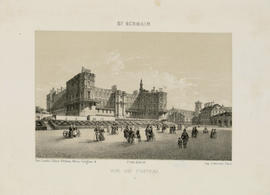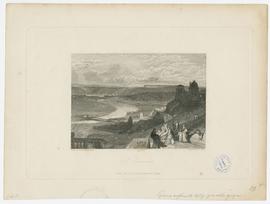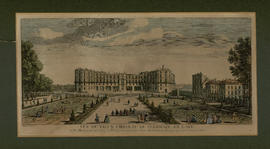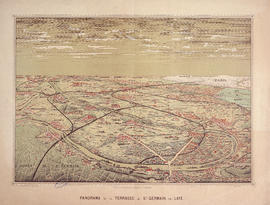Récit par Sophie von La Roche de sa visite à Saint-Germain-en-Laye
- 43
- Item
- 26 juin 1785
Part of Corpus numérique sur l'histoire du château et des jardins de Saint-Germain-en-Laye
« [p. 546] Wir kamen eben von der beruhmten Terrasse von St. Germain zuruck, die wir nicht nur wegen ihrer Schonheit, sondern auch mit einem gewissen Geist der Wallfahrt, fur das Andenken Heinrich des IV. Der sie auffuhren liess, besuchten, und von welcher man die vortrefliche Ausficht auf Paris, das Thal, die Seine und Marly hat ; ja man sagt : Dieses schone Schloss wurde nie verlassen worden seyn, wenn man Ludwig dem XIV. Die Ausficht auf die Thurme der Abten St. Denis hatte verbergen konnen, weil er nicht Kraft genug in seiner Seele fand, den Begrabnisort seiner Vorfahren mit Ruhe anzusehen. Ludwig der XI. Welcher auch den Tod furchtete, hatte dieses Schloss seinem Leibarzt, vielleicht aus der nemlichen Ursache, geschenkt ; Karl der V. hingegen hatte es, wegen der schonen Lage und [p. 547] gesunden Luft, im Jahr 1370 erbaut, und hatte freylich den Bennahmen des Weisen nicht verdient, wenn er den Gedanken des Todes nicht wie ein Mann getragen hatte. Er mag sich wohl oft bey Erblickung dieser bedeutenden Thurme vorgenommen haben, die Lorbeerkrone eines guten Nachruhms zur Zierde seiner Ruhestatte zu erwerben. KIarl der VI. verlohr St. Germain an die Englander. Sein Sohn kaufte es von einem englischen hauptmann zuruck. Franz der I. dachte darinnen an den Genuss seines Lebens bey der schonen Jagd in dem nahe anstossenden Wald. Man sieht noch an der obersten Fensterreyhe ringsumher im hof den gebrannten Salamander, welcher sein Sinnbild war. Henrich der IV. und Ludwig der XIII. vergrosserten und verschonerten es. Man will jetzo diess Schloss als Beweiss der Verganglichkeit ansehen, weil der Alcove, in welchem Ludwig der XIV. gebohren wurde, nun ein Staubwinkel ist, und die Gallerien, worinnen sich der hofstaat versammelte, Kornboden geworden sind. Ich habe nicht viel gegen diese Abanderung einzuwenden, den Ludwig der XIV. ist jetzo selbst nichts mehr, als eine Hand voll Staub, warum sollte das Zimmer davon befreyt seyn ? und nuzliche Kornmagazine fur das gemeine Wesen entehren, wie ich denke, die Stelle der Hofleute nicht sonderlich. Gerne mochte ich aber, dass der Zufall den lezten grosen Bewohner dieses von seinen Konigen verlassenen Hauses, Jacob den II. Konig von England, welcher seinen Thron verliess, in dem Zimmer hatte sterben lassen, in welchem sein Beschutzer gebohren wurde. Dieser hatte uber Veranderung und Verschiedenheit nachdenken und sprechen konnen. Merkwurdig ists, dass hier in den koniglichen Garten die ersten Springbrunnen im Grosen errichtet wurden, welche der Prasident [p. 548] Moncontis von Lyon erfand. Das Schloss ist ein groses Viereck, dessen angebaute grose Thurme auswarts als breite Vorsprunge, im Hof aber, als runde Thurme erscheinen. Das Ganze ist von dunkelrothen Ziegelsteinen und sehr hoch gebaut. Innen und aussen laufen Gallerien herum, von welchen man die angenehmste Aussicht hat. Der Theil des schonen Waldes, welcher an das Ende der Terrasse fuhrt, ist immer voll Spazierganger von der besten Menschenclasse. Man sahe ihnen an, dass Klugheit, Ruhe und Freundschaft unter ihnen wohnen. Viele angesehene Familien von Paris begeben sich hieher, eine vernunftige Stille und wohlfeilere Lebensmittel zu finden, und dennoch in der Nahe des Hofs von Versailles zu leben, wo sie leicht alles Neue erfahren, und die Gnadenzeit fur sich und die Ihrigen nutzen konnen. Wir gingen auch in die Kapelle, welche von schoner Bauart ist. Die Decke ist voll Gemalde aus der biblischen Geschichte, sehr fein gemalt, und die Einfassungen der Winkel, welche das Gemalde bildet, und die Saulen, welche das Gewolbe tragen, sind alle vortreflich vergoldet. Sie sind aber nicht nur ein Beweiss der alten Pracht, sondern auch der alten Kunst. Denn gewiss, die neuen Vergoldungen werden nicht so lange in ihrer Schonheit dauern. Ich wunschte einen alten Saal des Schlosses zu sehen. Aber er ist ganz verbaut, und wie das Louvre in Paris zu Gnadenwohnungen eingerichtet. Die Vorhöfe sind einsam und mit Gras bewachsen. Von den schonen Grotten, und in Wasserwerken sich bewegenden Gottern und Thieren, sieht man nichts mehr ; aber Leute jedes Alters, mit dem Ausdruck einer stillen Zufriedenheit, finden sich hier unter den Baumen, welches in Paris, dessen Rauchsaulen und Thurmspitzen man erblickt, nicht moglich ist, wo [p. 549] die Menschen vom Ehr und Geldgeitze, von Sorgen und Neugierde umher getrieben warden, und auch der, so in der Kutsche sizt, durch die Gegenstande der Pracht und Kunst, durch den Larmen der Fuhrwerke und Fussgänger aus dem Gleichgewichte gebracht wird. »
Untitled




